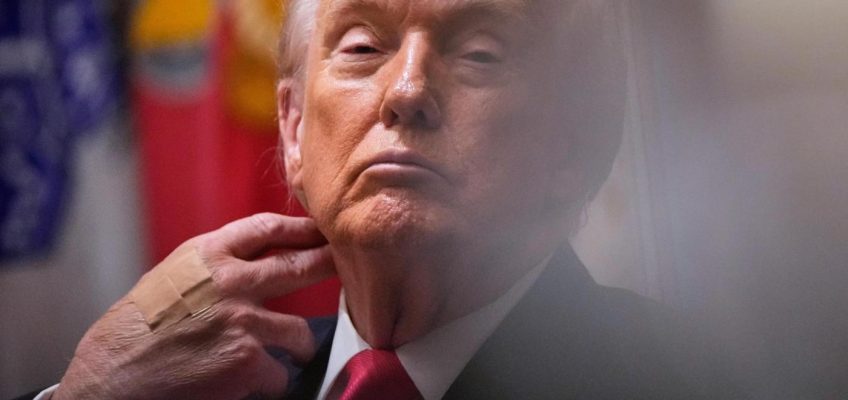By WILL WEISSERT and MICHELLE L. PRICE
WASHINGTON (AP) — With Tuesday’s White House Cabinet meeting chugging past the two-hour mark, President Donald Trump ‘s eyes fluttered and closed. His budget director busied himself doodling a fluffy cloud. Defense Secretary Pete Hegseth was lucky enough to speak early, but the title on his nameplate was misspelled.
Secretary of Defense Pete Hegseth’s name card is seen misspelled during a Cabinet meeting at the White House, Tuesday, Dec. 2, 2025, in Washington. (AP Photo/Julia Demaree Nikhinson)
The sleepy, and occasionally slipshod, gathering nonetheless ended with a flurry of news. Trump declared that he didn’t want Somalis in the U.S. and Hegseth cited the “ fog of war ” in defending a follow-up strike on an alleged drug-carrying boat in the Caribbean Sea in September.
The president started things off by noting that it was the last time his Cabinet would gather until 2026. And, though marathon sessions with his top advisers lavishing praise have become a Trump trademark since he returned to the White House, this latest installment felt at times like a holiday break was needed.
Trump offered lengthy opening comments largely rehashing his key previous policy announcements from recent months. He also repeated old grievances, going back to his falsehoods about having won the 2020 election.
‘Go quickly’
The president then gave each Cabinet member a chance to speak, declaring, “We’re gonna go quickly.” That did little to stop most Cabinet members from offering long presentations.
Hegseth went first and praised the Trump administration’s move to rename his agency the Department of War — something that can’t be officially done without an act of Congress. But the nameplate in front of Hegseth labeled him the “ssecretary of war,” including a mistaken double “S” that quickly became the source of searing online ridicule.
After that, as each official took turns speaking, a TV camera trained on Trump showed him struggling to stay alert. The president sat back in his chair with his eyes occasionally drooping and sometimes shutting completely.
President Donald Trump closes his eyes as Defense Secretary Pete Hegseth speaks during a Cabinet meeting at the White House, Tuesday, Dec. 2, 2025, in Washington. (AP Photo/Julia Demaree Nikhinson)
Trump’s apparent sleepiness followed his criticism of a recent New York Times story examining his schedule and stamina at age 79. Trump again slammed the Times story early in Tuesday’s meeting and even slipped into the third person to assure all involved that “Trump is sharp.”
Another indication that things were dragging came from budget director Russell Vought, who was spotted sketching a bucolic scene on White House letterhead.
Vought drew mountains framed by pine trees topped by the kind of friendly-seeming clouds that public television legend Bob Ross preferred to crowd his serene landscape paintings with. The budget chief also sketched an arrow underneath his mountain. Where it was supposed to be pointing was not clear.
Russ Vought, Director of the Office of Management and Budget, attends the Cabinet meeting at the White House, Tuesday, Dec. 2, 2025, in Washington. (AP Photo/Julia Demaree Nikhinson)
Clashing affordability messaging
Just as Trump’s admonishments to keep things tight were flouted, some of the Cabinet members also defied the president in their presentations when it came to the issue of affordability.
Trump made a point in his opening remarks to call concerns that Democrats have raised about rising costs a “con job.” That didn’t stop many of his administration’s top voices from earnestly detailing how they were indeed seeking to reduce prices nationwide.
Agriculture Secretary Brooke Rollins talked about economic pressures on farmers, Treasury Secretary Scott Bessent called affordability a “crisis,” and Housing and Urban Development Secretary Scott Turner said that hundreds of thousands of Americans becoming first-time homebuyers was an example of how the administration was making strides to achieve greater affordability.
The final speaker was Secretary of State Marco Rubio, who spoke for several minutes and acknowledged: “I know I’m last, so I wanted to be fast. But there’s a lot to cover.”
All told, Tuesday’s gathering lasted more than two hours. That fell short of Trump’s Cabinet meeting record: an August marathon that stretched to a whopping three hours and 17 minutes.
Still, even the president acknowledged that the latest meeting was going long. “We’re spending a lot of time in here,” he said.
President Donald Trump stands up to depart following a Cabinet meeting at the White House, Tuesday, Dec. 2, 2025, in Washington. (AP Photo/Julia Demaree Nikhinson)
Trump wrapped things by taking questions from reporters, but only after jokingly asking, “After that, do you WANT to ask any questions?” He also pointed at a journalist holding a boom mic to capture sound from the Cabinet meeting and playfully offered, “How strong are you?”
“You’ve been holding that for two hours,” the president continued, drawing laughs from Cabinet members. “There are very few people who could do that. I’m very proud of you.”
A newsy Q&A
Reporters’ questions shook off the doldrums.
Related Articles
Trump says National Guard will be sent to New Orleans
US Justice Department seeks to dismiss Maurene Comey lawsuit on procedural grounds
Trump administration says it will withhold SNAP from Democrat-led states if they don’t provide data
Despite legal challenge, Florida college votes again to transfer land for Trump presidential library
Trump says he doesn’t want Somali immigrants in the US, urges them to go back to their homeland and fix it
Hegseth said he did not see that there were survivors in the water when the second strike on the boat off Venezuela was ordered and launched in early September. He said “the thing was on fire” and cited the “fog of war” in defending what occurred. He also said he “didn’t stick around” for the remainder of the Sept. 2 mission following the initial strike.
In response to a later question, Trump declared he didn’t want Somali immigrants in the U.S., adding that residents of the war-ravaged eastern African country should stay there and try to fix their homeland. He also accused Somalis of being too reliant on U.S. aid programs while offering little to the nation in return.
That drew applause from his Cabinet, though the questions ended abruptly with journalists soon hustled out of the room. Trump punctuated the conclusion by slapping his hand twice on the table, pushing his chair back, standing up and thumping Hegseth on the shoulder.




